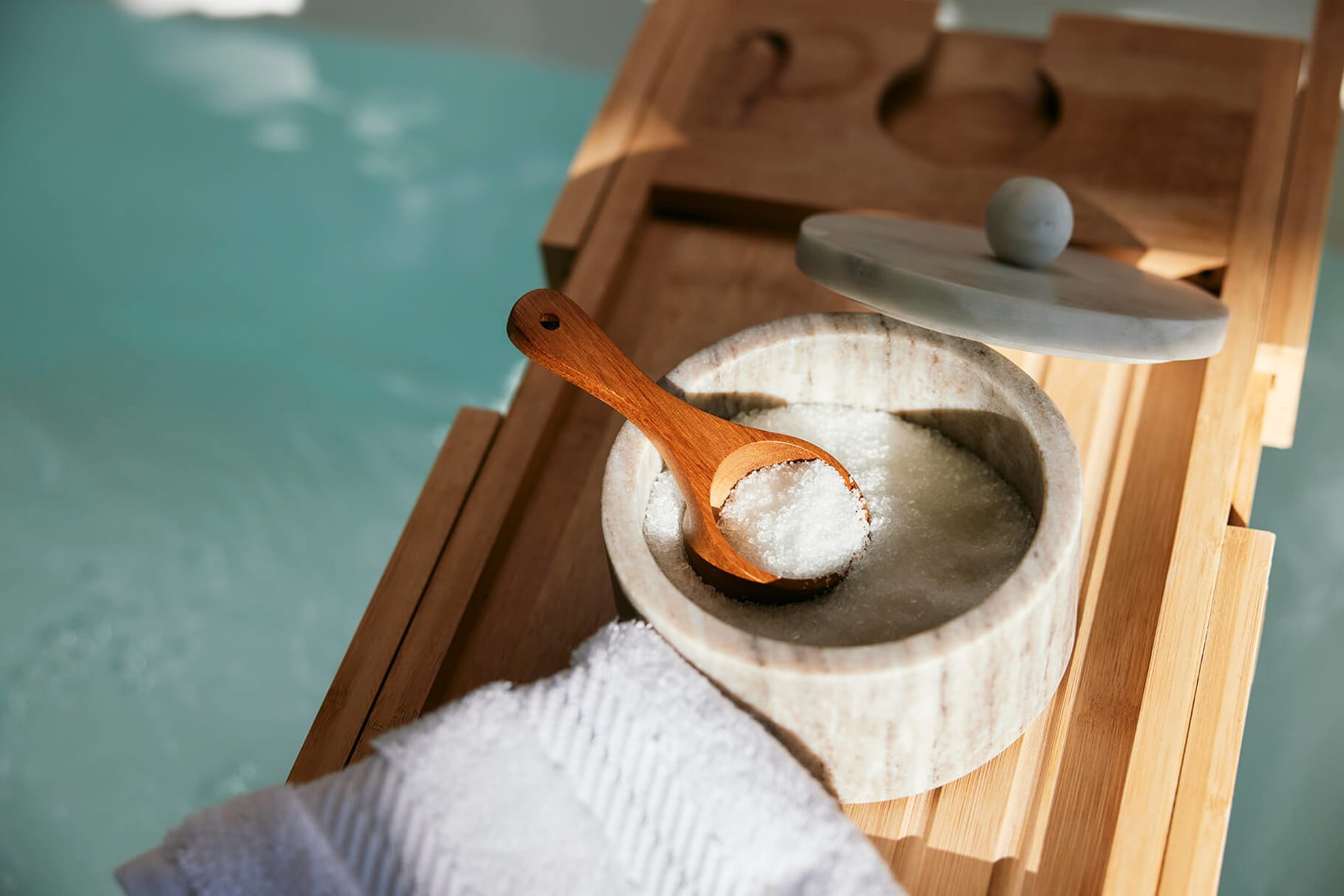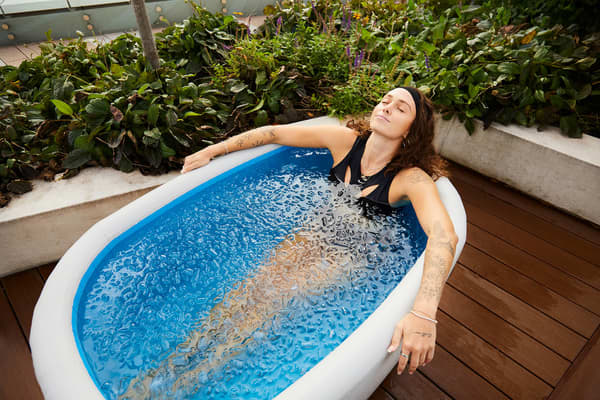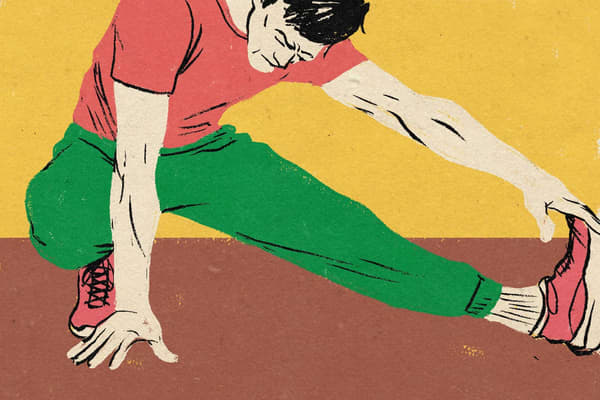The post-workout benefits of an Epsom salt bath
Sport & activity
Have you been sleeping on the benefits of soaking in a warm bath?

Any solid fitness routine requires an equally strong post-workout recovery routine. And while recovery trends and tools are always popping up, there's one simple, centuries-old remedy that has stuck around: hopping in a warm Epsom salt bath.
Some athletes and fitness experts say that Epsom salt baths can help reduce sore muscles and inflammation—so, does it work? And how? We talked to experts to dive into the science and explain the potential post-workout benefits of an Epsom salt bath.
What are Epsom salts, anyway?
Epsom salt, also known as magnesium sulphate, is a naturally occurring mineral salt. It can easily be found at your local supermarket or pharmacy, ready to be dissolved into a warm bath. (Unlike the salt you eat, Epsom salt isn't meant to be digested.)
The name comes from the town of Epsom in England, where the salt was discovered by a farmer about 400 years ago, turning the town into a spa getaway for Londoners looking to heal scratches, sores and rashes.
Today, many people use Epsom salts for a wide range of potential therapeutic properties. Despite a lack of definitive research pointing to the benefits of Epsom salt baths, many people claim they can help ease arthritis pain and swelling, bruising, constipation, insomnia and migraines.
On the recovery side, Epsom salt baths are often used by people looking to relieve muscle pain and stiffness—so, let's break it down.

Are there recovery benefits to taking Epsom salt baths?
Proponents of Epsom salt baths believe that when added to warm water, the magnesium dissolves and is absorbed into the body through the skin—allowing a whole host of benefits.
Why is magnesium helpful, especially for workout recovery? "Magnesium is an essential mineral present in our bodies that assists with normal muscle function including contraction and relaxation", said Dennis A. Cardone, DO, a sports medicine specialist and team doctor for athletic programmes, including a major tennis championship. In fact, the nutrient keeps not just your muscles healthy and functioning, but also your bones, heart and almost every other organ in your body.
"Sometimes people who are deficient in magnesium have issues with muscle cramping or muscle pain", said Jason Machowsky, CSCS and exercise physiologist. One small study of professional male cyclists even found that magnesium supplementation helped recovery after strenuous exercise and had a "protective effect on muscle damage". Machowsky cautions that supplements should be taken under the guidance of a doctor or dietician. Luckily, it's naturally found in many foods like green leafy vegetables, legumes, nuts, seeds and wholegrains.
The only problem: "The fact that soaking in a warm bath of Epsom salt results in actually getting that magnesium into your body remains to be seen", Machowsky said. "We don't have any research showing Epsom salt can be absorbed through the skin in significant enough quantities to affect blood levels of magnesium", he said.
"The benefits of an Epsom salt bath appear to be wholly related to the soaking in warm water", adds Cardone. "While ice baths have recently become popular to reduce inflammation, a hot bath can improve blood flow—delivering oxygen and nutrients to the muscles—and elasticity of the connective tissue", Cardone said. This can help ease pain caused by delayed-onset muscle soreness, or DOMS.
There's another indirect recovery benefit, both Cardone and Machowsky said. "Perhaps most important is that soaking in a warm bath can be relaxing and benefit our mental and emotional health", Cardone said.
Research shows that warm baths can decrease cortisol, a stress hormone. "A 2019 study in the journal Sleep also found that a 10-minute warm bath an hour or two before bed can help you fall asleep faster and improve sleep quality—and a good night's sleep that spans eight to nine hours is important for muscle recovery and performance", Cardone said.
"Given the kind of stressful world that we live in, anything we can do to promote a calm environment for ourselves, including time to actively relax and allow your body to rest and recover, is important—regardless of whether you put the salts in", Machowsky said.
Plus, there's the power of the brain-body response known as the placebo effect. Researchers have found placebos (or inactive treatments, such as a sugar pill) can lead to real, measurable physiological changes providing similar benefits to medications. In other words, thinking that Epsom salt baths are soothing or improving muscle pain or speeding up your recovery might be reason enough to keep using them. "If you believe it's going to help you, odds are it may help you", even if we don't have good data to say the direct cause is the magnesium sulphate, Machowsky said.
Are there any side effects of using Epsom salts in a bath?
While more research is needed to determine whether magnesium can be absorbed into the skin to ease sore muscles or speed up recovery, it's also low risk, Machowsky and Cardone point out.
However, if you have a burn, wound or skin infection, it's best to avoid taking an Epsom salt bath. And if you have a skin condition like eczema or psoriasis, or sensitive skin, talk to your doctor first.
Jennifer Chwalek, MD, a dermatologist, noted that Epsom salt baths could soothe skin conditions like eczema or psoriasis in some cases thanks to the anti-inflammatory effects of magnesium. "Some research suggests that magnesium applied topically might be able to be absorbed through hair follicles", she said.
However, the temperature of the water is key. "If the water is really hot—with or without Epsom salts—this can be damaging to the skin because it can dry it out", Chwalek said.

How to take an Epsom salt bath
While the benefits may be anecdotal, there aren't many downsides since Epsom salt is accessible and generally safe for most people.
If you want to try an Epsom salt bath to ease stress, reduce muscle pain and improve your sleep, simply pour a cup of Epsom salt (look for a product that's 100 percent magnesium sulphate) into your bath as the water fills up.
"I think Epsom salt baths can be soothing post-yoga or exercise as long as the bath water isn't too hot", Chwalek said.
Frequently Asked Questions
Should you rinse off after an Epsom salt bath?
This is your choice. Some people choose not to rinse after taking an Epsom bath. Others might want to follow up their Epsom salt bath with a quick shower to rinse off any excess salt since it could dry out the skin.
How long should you sit in a bath with Epsom salt?
This is a personal preference, but it’s generally recommended to give yourself at least 15 minutes. If baths are stress-relieving for you, stay for up to an hour.
Words by Kylie Gilbert





